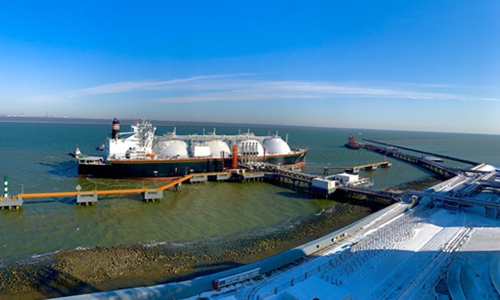
File photo: Courtesy of Sinopec
China's largest oil refiner Sinopec on Thursday announced the completion of an ultra-long horizontal shale gas well drilling facility, located in Fuling district, Southwest China's Chongqing city, which set a domestic record with a horizontal expanse of 4,286 meters.With a depth of 7,161 meters, the 18-S12HF well of Sinopec has broken two records. In addition to the 4,286-meter long horizontal section, it also achieved a 4,225-meter long horizontal "one trip drilling", according to China Media Group (CMG).
It marked a major breakthrough in the drilling of ultra-long horizontal wells for shale gas in China, which will give a strong boost to the production of the resource, said the CMG report.
Shale gas is an unconventional gas reservoir, also known as a type of "artificial gas reservoir", which requires the shale to be crushed to release the gas. It's recognized by the industry as a world-class challenge. Drilling horizontal wells is a crucial technology.
"Ultra-long horizontal well" refers to a horizontal well with a horizontal section of more than 3,000 meters. With multiple challenges, including higher risk of a shaft wall collapse, it's been an issue for high-efficiency shale gas exploitation.
The 18-S12HF well has proven reserves of 900 billion cubic meters (bcm) and cumulative production exceeding 47 bcm. It has delivered clean energy to more than 70 cities along the Yangtze River Economic Belt, benefiting more than 1,000 enterprises and nearly 200 million residents, the company said.
China has been stepping up efforts to establish a sound and diverse energy supply system over the past 10 years, with a self-sufficiency rate exceeding 80 percent, according to the National Energy Administration (NEA).
The country's energy supply system has withstood the tests of the disruptive COVID-19 pandemic and major natural disasters, and it cushioned the impact of volatile international energy prices, providing a solid energy guarantee for China's high-quality economic development, Ren Jingdong, deputy director of the NEA, said at a press conference on October 17.
Global Times


